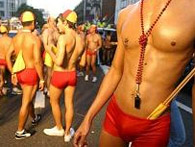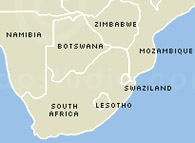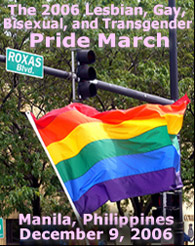Sydney MSM HIV infection rate rises to epidemic levels: researcher
A HIV/AIDS researcher has said that Sydney's gay community has an infection rate of HIV that is similar to that of countries in Africa.

Garrett Prestage, a lecturer at the National Centre in HIV Epidemiology and Clinical Research (NCHECR), said that, in the inner-city area, 10 to 18 per cent of the gay population was HIV infected.
In Lesotho in Africa, the rate was 20 per cent last year, UN figures show.
Figures also show that southern Africa is the centre of the HIV epidemic; 32 per cent of people with HIV globally live in the region and 34 per cent of AIDS deaths globally occur there.
Last year in the state of New South Wales, 954 people were diagnosed with HIV and nearly three-quarters of them were injected through homosexual contact. By comparison only 109 people in NSW were reported to have had the mumps last year.
"For gay men, HIV is a massive epidemic," Dr Prestage said. "If you are a gay man living in central Sydney, you are living with rates of HIV that are equivalent to sub-Saharan Africa."
According to the 2006 annual survey report, issued by the NCHECR, found that new HIV infections reported in Australia rose from 656 in 2000 to 930 in 2005 - a 41 percent leap.
Gay men accounted for about 70 percent of the new cases. Heterosexuals made up 19 percent, while intravenous drug users and unknown transmission paths accounted for the rest.
According to the report, new infections hit an all-time high of about 1,700 in 1984, then declined steadily through the late 1990s. But in 2000, the trend apparently reversed.
AIDS advocacy organisations in Australia have warned that infection rates were on a steady increase in Australia as so-called "treatment optimism" could make some people more likely to take risks, or "at least rationalize having unprotected sex."
Related site:
National Centre in HIV Epidemiology and Clinical Research
S African Parliament passes gay marriage Bill
South Africa is a step closer to legalising same-sex marriage after the controversial legislation passed both houses of Parliament. Only President Thabo Mbeki's signature is now needed for the country to become one of a handful of countries and the first in Africa to have legislated in favour of homosexual marriages.

President Thabo Mbeki has two days to consider and sign the Same-Sex Marriage Bill into law after the National Council of Provinces passed the controversial measure. He must now sign the legislation by Friday to comply with a ruling from South Africa's Constitutional Court.
The country's ruling party, the ANC, ensured the Bill passed through both houses of Parliament easily. The Bill was passed with 36 votes in its favour, 11 against it and one abstention from a group of 54 MPs.
Religious groups in South Africa have been calling for the legislation to be abolished or at least revised. They say same sex marriage is taboo in black African culture, but they have failed to convince the lawmakers. The Constitutional Court last year set a December 1 deadline for South Africa to revise its marriage laws to include same sex partnerships, saying the law would be changed automatically if parliament did not act.
South Africa, where public opinion is often bitterly opposed to homosexuality, is expected to become the fifth country in the world to afford gay and lesbian couples the same legal status as married heterosexuals.
Filipino gay men and lesbians to match on Dec 9 against discrimination

The Pride March will take place in Manila City on December 9, 2006 as the Philippine Congress is currently considering a landmark legislation that will prohibit discrimination based on sexual orientation and gender identity.
The Anti-Discrimination Bill seeks to penalise discrimination on the basis of sexual orientation and gender identity in many areas, particularly in education, healthcare, workplace, public service, and law enforcement, among others.
The Assembly is at 3pm at Remedios Circle, Malate, and participants will all march to Rajah Sulayman in Roxas Blvd.
The non-profit advocacy LAGABLAB-Pilipinas (Lesbian and Gay Legislative Advocacy Network) is working with Amnesty International on a campaign to help pass the two bills currently being debated in the House and the Senate. If passed, the Philippines will be the only other country, besides Fiji, to have such Constitutional protection in the Asia Pacific region.
According to LAGABLAB, the Anti-Discrimination Bill's passage is blocked by the Chairperson of the Committee on Human Rights, Rep. Bienvenido Abante (6th Distict, Manila City), who is also a Baptist pastor and president of Bible Believers' League for Morality and Democracy (BibleMode).
In opposing the bill, he said the enactment of the bill would invite the wrath of God and would mean "death to a just and humane society that promotes the common good; death to the most cherished Filipino values of Godliness and moral rectitude."
He added: "The bill, once passed into law, legitimises homosexuality and lesbianism as acceptable lifestyles in Philippine society. However, the Bible clearly speaks against homosexuality and lesbianism as practices that are ungodly and wrong."
LAGABLAB has called for the resignation on Rep. Abante as Chair of the Committee on Human Rights and urges readers to write to Office of House Speaker Jose de Venecia (devenecia@pldtdsl.net)
In related news, Ang Ladlad (The Outing) has announced that they would register to contest the Philippines' party-list elections in May next year. The group, which was formed in September 2003, is led by chair Danton Remoto, who had recently registered the group as a party-list organisation at the office of the Commission on Elections in Manila, making the group the first Filipino LGBT political party.
For more info on the march, visit pridemanila.wordpress.com
Related sites:
LAGABLAB
Ang Ladlad
